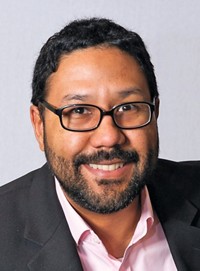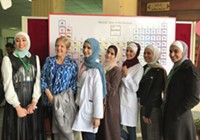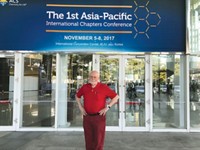Advertisement
Grab your lab coat. Let's get started
Welcome!
Welcome!
Create an account below to get 6 C&EN articles per month, receive newsletters and more - all free.
It seems this is your first time logging in online. Please enter the following information to continue.
As an ACS member you automatically get access to this site. All we need is few more details to create your reading experience.
Not you? Sign in with a different account.
Not you? Sign in with a different account.
ERROR 1
ERROR 1
ERROR 2
ERROR 2
ERROR 2
ERROR 2
ERROR 2
Password and Confirm password must match.
If you have an ACS member number, please enter it here so we can link this account to your membership. (optional)
ERROR 2
ACS values your privacy. By submitting your information, you are gaining access to C&EN and subscribing to our weekly newsletter. We use the information you provide to make your reading experience better, and we will never sell your data to third party members.
Environment
ACS Reaches Out Globally
Society President Joseph S. Francisco furthers international collaborations in 2010
by Madeleine Jacobs, ACS Executive Director and Chief Executive Officer
November 29, 2010
| A version of this story appeared in
Volume 88, Issue 48

This year has been an exceptionally busy one for ACS President Joseph S. Francisco, who committed to a focus on international collaborations and their centrality in maintaining competitiveness in a global economy in his President’s Message (C&EN, Jan. 4, page 2). To support his focus, Francisco traveled widely, engaging global leaders in the chemical enterprise to collaborate with ACS in creating opportunities for undergraduates, graduate students, and researchers.





Francisco’s travels this year have taken him to Canada, England, Egypt, China, South Korea, Taiwan, Germany, Norway, Colombia, Bahrain, and Israel, where he was welcomed by dignitaries and sister societies. In his travels, Francisco says, “I have learned many important lessons. One such lesson is that the global chemistry enterprise looks to the U.S. to take the leadership role in addressing the challenge of global sustainability. I am pleased that both past and present leadership of ACS have positioned us well to ensure that leadership role.”
The second half of the year has been especially packed. From May 28 to June 1, Francisco traveled to the 93rd Canadian Chemistry Conference & Exposition in Toronto. I accompanied Francisco as he gave a presentation to the Canadian Society for Chemistry board and discussed areas of cooperation with CSC at that meeting and throughout the week. Of particular note were areas in which CSC and ACS could collaborate during 2011, the International Year of Chemistry (IYC 2011).
In early July, Francisco, ACS Board Chair Bonnie A. Charpentier, ACS Secretary & General Counsel Flint H. Lewis, and I traveled to London to participate in meetings with the Royal Society of Chemistry council and to further discussions with RSC concerning areas of cooperation outlined in the ACS-RSC Memorandum of Understanding (C&EN, Aug. 16, page 13, and Nov. 16, 2009, page 8). Among the highlights of the RSC visit was a special dinner in the House of Commons. A surprise visitor that evening was Rep. Bart Gordon (D-Tenn.), chair of the U.S. House Science & Technology Committee, who was in London to visit his counterpart, Andrew Miller, a member of Parliament and chair of its Science & Technology Select Committee.
Francisco’s travel to Asia made a particular impression on him. As countries such as South Korea, Taiwan, and China have emerged on the world stage of industrial economies, they have realized that science and technology innovations are essential for their continued economic growth and development. Francisco notes that Asian countries are investing in their people. “There is a new class being formed,” he observes, “a class which is highly skilled and educated and has specialized in areas where they have cornered a market niche that gives them an important competitive advantage. These countries offer lessons to be learned on how industry, academia, and government can work together to advance their economies.”
From Aug. 8 to 13, Francisco attended the 21st International Conference on Chemical Education in Taipei, Taiwan, where he gave several presentations, including remarks at the opening ceremonies and an introduction of plenary lecturer Richard N. Zare, chemistry department chair at Stanford University. Francisco also gave a presentation on “Educating for a Sustainable Future: Looking through the Lens of the International Year of Chemistry 2011,” and he participated in a panel with the presidents of the International Council for Science, the Federation of Asian Chemical Societies, the Korean Chemical Society, and the Philippine Chemical Society. The panel discussed the role of chemical education and sustainability in the global age.
Later that month, we traveled with Francisco G. Gomez of the ACS Office of International Activities to the 3rd EuCheMS (European Association for Chemical & Molecular Sciences) Congress in Nuremberg, Germany. Francisco says he sees EuCheMS as an emerging and important science venue to bring the European chemistry community together and highlight important chemical innovations coming from the laboratories across Europe. He was very proud of the ACS presence at EuCheMS to support this important conference for the European chemical community. “Most exciting to me,” Francisco notes, “was how young European scientists are leading the way to educate future entrepreneurs.”
From Nuremberg, Francisco and I traveled to Oslo, where we were guests of The Kavli Foundation at the 2010 Kavli Award ceremonies and activities. ACS and Kavli have signed a three-year agreement for Kavli to sponsor plenary lectures at each ACS national meeting from 2011 to 2013 (C&EN, July 19, page 42; see page 46).
From Sept. 27 to Oct. 1, Francisco traveled to Cartagena, Colombia, for the XXIX Latin American Chemistry Congress. The event, hosted by the Latin American Federation of Chemical Associations (FLAQ) and organized by the Colombian Society of Chemical Sciences and the Colombian Chemical Association, convened scientists from across Latin America to discuss the role of the chemical enterprise in ensuring the responsible and efficient use of natural resources. The meeting attracted more than 1,500 scientists. Francisco gave remarks during the opening ceremony and presented FLAQ with a commemorative plaque in recognition of its 50th anniversary in 2009.
Francisco and various units of ACS had strong involvement during the Congress, including staging a scientific forum at the Universidad Tecnológica de Bolívar. Nearly 200 teachers and college students heard a number of international scientists share their life stories and provide insights on motivating students to become successful scientists.
ACS also hosted a daylong hands-on outreach event for more than 300 middle and high school students from local schools around Cartagena. Francisco, 2008 Chemistry Nobel Laureate Martin Chalfie, former NSF Chemistry Division director Luis Echegoyen, and University of Puerto Rico chemistry professor Ingrid Montes gave presentations and demonstrations.
“One of the most exciting moments was when I went to give a talk in a middle school in Cartagena and saw in the students a willingness, eagerness, and readiness to learn,” Francisco recalls. “There was a fire in their eyes and a passion to learn chemistry. It struck me at that moment that ACS has an untapped opportunity to enrich the lives of these young people and through them bring North and South America together in a unifying way for the chemistry enterprise in the Americas.”
On Oct. 18 and 19, Francisco attended the 8th International Conference & Exhibition on Chemistry in Industry (CHEMINDIX) in Bahrain, where he was a featured speaker. This event is organized by the ACS Saudi Arabian International Chemical Sciences Chapter (SAICSC), the first and oldest ACS international chapter (C&EN, Aug. 23, page 43). “The chapter has over the years had an important impact in bringing practitioners and chemical industry in the Middle East region together,” Francisco notes.

Some 1,500 participants from more than 40 countries attended the conference with the theme of “Innovative Technologies for Tomorrow’s Energy Demand.” Francisco provided plenary remarks and a plenary technical presentation, based on research from his laboratory at Purdue University, titled “Fundamental Chemistry of Alternative Fuels.” ACS also presented a preconference workshop called “Project Management for Technical Professionals” as well as an exhibit highlighting its membership services and IYC 2011. Bradley D. Miller, director of the ACS Office of International Activities, accompanied Francisco.
A special moment that brought the whole year together for Francisco was being selected as the first Distinguished Lise Meitner-Fellow Lecturer at Hebrew University in Jerusalem. The lectureship honored Francisco for “his contributions to his research in atmospheric chemistry and his outstanding activities in the service of chemistry while president of the American Chemical Society during 2010.”
As Francisco reflects over his presidential year, he says: “It has been about creating opportunities for our citizenry to develop skills and gain experience to function effectively and competitively in the global marketplace by keeping innovations from around the globe flowing into the chemical enterprise of this country. International collaborations are essential to the future health and vibrancy of chemical research and innovations from our industries and universities. ACS is key to catalyzing these opportunities for our enterprise.

“The seeds we plant now to create opportunities for current and future generations to work in the global chemical enterprise are an investment in the long-term future of this country’s growth, hope, innovation, life, and happiness,” Francisco continues. “This has been an exciting year working to plant the seeds of opportunity for our chemical enterprise at home and abroad. I thank all ACS members for giving me the opportunity to serve the chemical enterprise at the highest level. It is truly a great honor and my pleasure serving all our members around the globe.”

Francisco Gomez and Bradley Miller contributed to this article.

During 2010, ACS President Joseph S. Francisco traveled to nearly a dozen countries to engage global leaders in the chemical enterprise for purposes of collaborating with ACS in creating opportunities for undergraduates, graduate students, and researchers. Francisco committed to a focus on international collaborations during his presidential year. In addition to the photos appearing in the Nov. 29 issue of C&EN, these photos highlight some of Francisco's interactions in Saudi Arabia, Colombia, Canada, and Norway. -Madeleine Jacobs





Join the conversation
Contact the reporter
Submit a Letter to the Editor for publication
Engage with us on Twitter